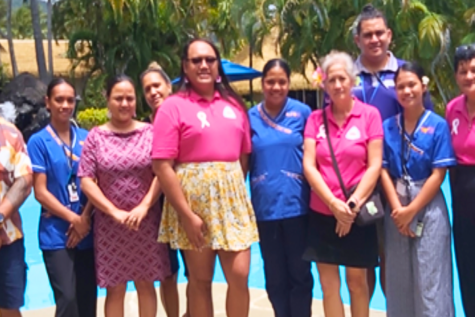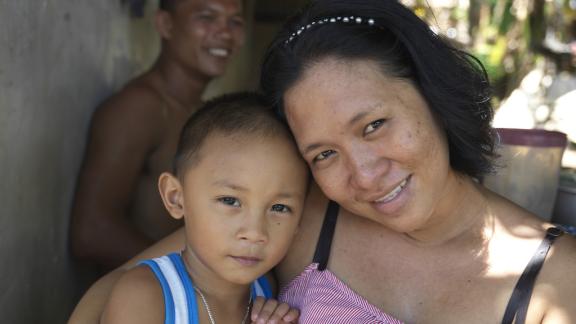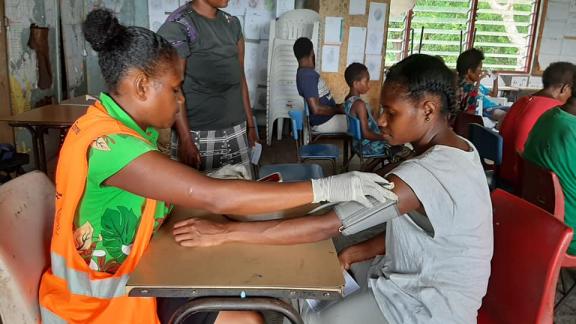Spotlight
A selection of resources from across the Federation

Cook Islands, New Zealand
Ora’anga Meitaki no te Vainetini: Cook Islands Women’s Wellbeing in the Context of Abortion
In 2022, research on abortion, including unsafe abortion, in Cook Islands was conducted by the University of New South Wales, University of the South Pacific Cook Islands Campus Te Puna Vai Mārama | Centre for Research, and Cook Islands Family Welfare Association (CIFWA). Ora’anga Meitaki no te Vainetini: Cook Islands Women’s Wellbeing in the Context of Abortion includes the lived experiences and stories of women, advocates, support persons and health workers in the Cook Islands and Aotearoa New Zealand.
Filter our resources by:


| 03 July 2020
COVID-19 Response Issue #2: Situation in East Asia, South East Asia and the Pacific, June 2020
This is the second update from the ESEAO Regional Office on the situation brought on by the COVID-19 pandemic. We highlight the impact of COVID-19 on the Sexual and Reproductive Health and Rights (SRHR) of Youth and Adolescents and a closer view of IPPF Member Associations’ youth-led initiatives providing essential sexual and reproductive health care through uninterrupted SRH service delivery, dissemination of accurate SRH information, and provision of sexuality education through online platforms and social media.
| 30 June 2020
Niu Waves – June 2020- Newsletter from the Sub-Regional Office for the Pacific
Catch up on the latest sexual and reproductive health news from the Pacific with Niu Waves, the monthly newsletter from the Sub-Regional Office for the Pacific (SROP). Each month, SROP compiles key news and events from Member Associations across the Pacific and the sub-regional office to inspire and educate. Browse our latest issues here. For more information or to be added to the distribution list, please email [email protected].

| 07 May 2020
Advocacy Key Messages: SRHR & COVID-19
The world we are living in today is mired by the COVID-19 pandemic, the largest health and socioeconomic crisis that we have ever seen. As the pandemic continues to grow, governments and health systems are taking unprecedented action to contain the spread of COVID-19, restricting movements and redirecting resources to fight the outbreak. In East Asia, South East Asia and Oceania Region (ESEAOR), access to sexual and reproductive health (SRH) services, from antenatal care, contraception, anti-retroviral treatment and abortion, has suffered significantly. The ESEAOR continues to be the most disaster-prone region and with COVID-19, countries may have to contend with multiple disasters, further stretching resources and reducing the population’s ability to cope. As the breadth of the pandemic continues to unfold and the true impacts emerge, sexual and reproductive health and rights (SRHR) must be a priority to ensure women and girls and other vulnerable groups have access to life-saving SRH services without discrimination. The pandemic further exacerbates pre-existing gender and social inequalities and excludes vulnerable groups – essentially making a bad situation for women, girls and other vulnerable groups including the elderly, adolescents and young people, people living with disabilities, members of the LGBTQI+ community, indigenous people, migrants and refugees, even worse. Governments must define and implement people-centred programmes grounded in human rights, with meaningful engagement of civil society organisations, that are both gender-responsive and youth-centred. We call on Governments to recognise that SRHR is a public health issue and ensure adequate investment is made: Women and girls must have uninterrupted access to sexual and reproductive health (SRH) information, services and commodities; Universal access to sexual and reproductive health (SRH) services especially for the most marginalised populations is a human right; and Women, girls, and young people realise their rights and have control over their bodies, their lives and their futures without violence and inequalities. These documents are a guide for regional and national advocacy work to demand that governments take action to ensure the rights of women and girls, in all their diversity are realised and protected, including the availability of, and accessibility to SRH information, education and services, during the COVID-19 pandemic

| 06 May 2020
Advocacy Key Messages: SRHR & COVID-19
The world we are living in today is mired by the COVID-19 pandemic, the largest health and socioeconomic crisis that we have ever seen. As the pandemic continues to grow, governments and health systems are taking unprecedented action to contain the spread of COVID-19, restricting movements and redirecting resources to fight the outbreak. In East Asia, South East Asia and Oceania Region (ESEAOR), access to sexual and reproductive health (SRH) services, from antenatal care, contraception, anti-retroviral treatment and abortion, has suffered significantly. The ESEAOR continues to be the most disaster-prone region and with COVID-19, countries may have to contend with multiple disasters, further stretching resources and reducing the population’s ability to cope. As the breadth of the pandemic continues to unfold and the true impacts emerge, sexual and reproductive health and rights (SRHR) must be a priority to ensure women and girls and other vulnerable groups have access to life-saving SRH services without discrimination. The pandemic further exacerbates pre-existing gender and social inequalities and excludes vulnerable groups – essentially making a bad situation for women, girls and other vulnerable groups including the elderly, adolescents and young people, people living with disabilities, members of the LGBTQI+ community, indigenous people, migrants and refugees, even worse. Governments must define and implement people-centred programmes grounded in human rights, with meaningful engagement of civil society organisations, that are both gender-responsive and youth-centred. We call on Governments to recognise that SRHR is a public health issue and ensure adequate investment is made: Women and girls must have uninterrupted access to sexual and reproductive health (SRH) information, services and commodities; Universal access to sexual and reproductive health (SRH) services especially for the most marginalised populations is a human right; and Women, girls, and young people realise their rights and have control over their bodies, their lives and their futures without violence and inequalities. These documents are a guide for regional and national advocacy work to demand that governments take action to ensure the rights of women and girls, in all their diversity are realised and protected, including the availability of, and accessibility to SRH information, education and services, during the COVID-19 pandemic.

| 05 May 2020
Advocacy Key Messages: SRHR & COVID-19
The world we are living in today is mired by the COVID-19 pandemic, the largest health and socioeconomic crisis that we have ever seen. As the pandemic continues to grow, governments and health systems are taking unprecedented action to contain the spread of COVID-19, restricting movements and redirecting resources to fight the outbreak. In East Asia, South East Asia and Oceania Region (ESEAOR), access to sexual and reproductive health (SRH) services, from antenatal care, contraception, anti-retroviral treatment and abortion, has suffered significantly. The ESEAOR continues to be the most disaster-prone region and with COVID-19, countries may have to contend with multiple disasters, further stretching resources and reducing the population’s ability to cope. As the breadth of the pandemic continues to unfold and the true impacts emerge, sexual and reproductive health and rights (SRHR) must be a priority to ensure women and girls and other vulnerable groups have access to life-saving SRH services without discrimination. The pandemic further exacerbates pre-existing gender and social inequalities and excludes vulnerable groups – essentially making a bad situation for women, girls and other vulnerable groups including the elderly, adolescents and young people, people living with disabilities, members of the LGBTQI+ community, indigenous people, migrants and refugees, even worse. Governments must define and implement people-centred programmes grounded in human rights, with meaningful engagement of civil society organisations, that are both gender-responsive and youth-centred. We call on Governments to recognise that SRHR is a public health issue and ensure adequate investment is made: Women and girls must have uninterrupted access to sexual and reproductive health (SRH) information, services and commodities; Universal access to sexual and reproductive health (SRH) services especially for the most marginalised populations is a human right; and Women, girls, and young people realise their rights and have control over their bodies, their lives and their futures without violence and inequalities. These documents are a guide for regional and national advocacy work to demand that governments take action to ensure the rights of women and girls, in all their diversity are realised and protected, including the availability of, and accessibility to SRH information, education and services, during the COVID-19 pandemic.
| 28 April 2020
COVID-19 Response: Situation in East Asia, South East Asia and the Pacific, April 2020
This is the first update from the ESEAO Regional Office on the situation brought on by the COVID-19 pandemic. This publication highlights the impact of COVID-19 on Sexual and Reproductive Health and Rights (SRHR), provides a closer view to the impact on our Member Associations, their most urgent needs and how they are working at the frontlines; synthesizes the latest IPPF actions in support of our MAs and recommendations for policy-makers and governments to ensure SRHR is considered an essential health service for all, without discrimination.









